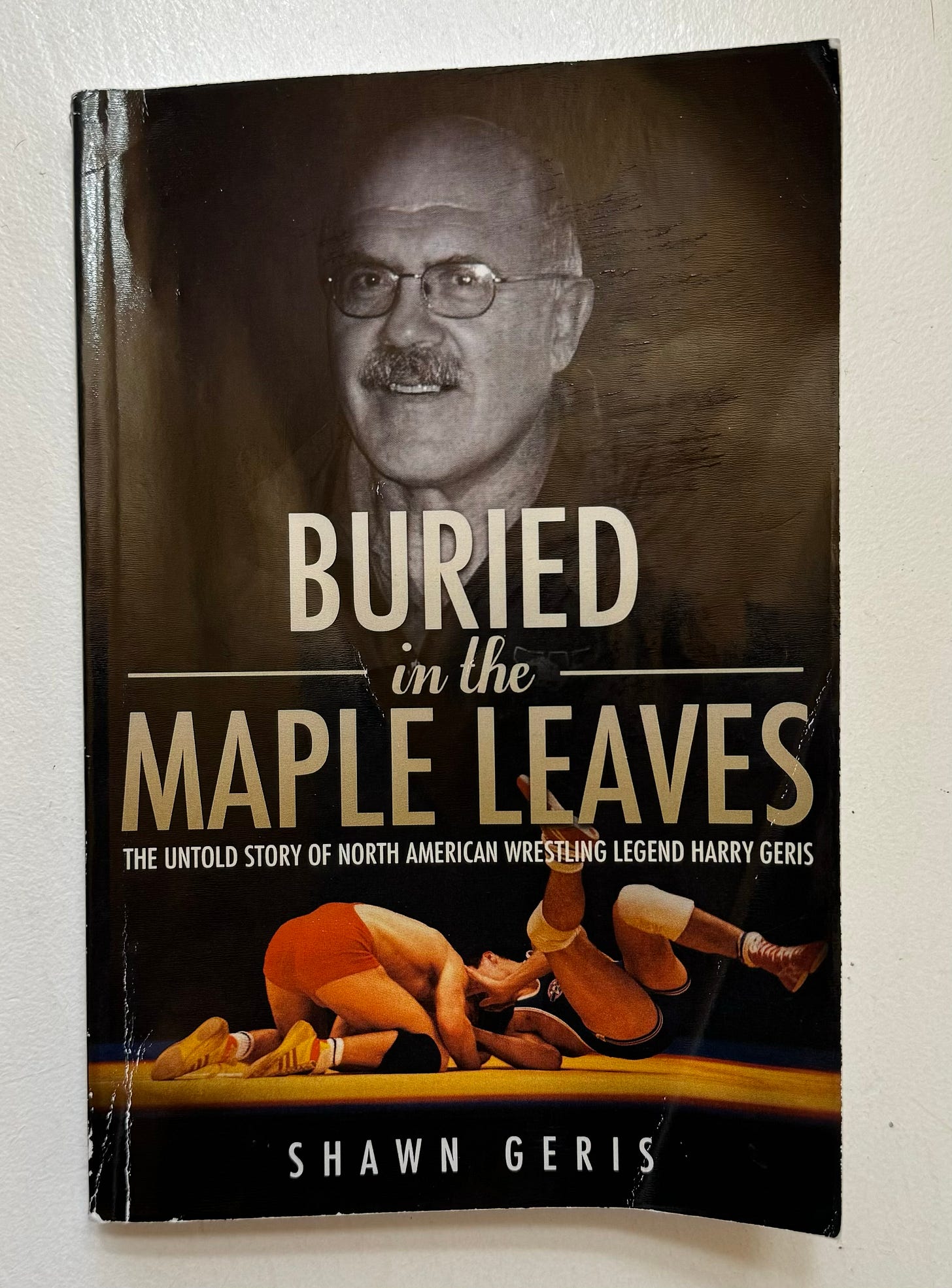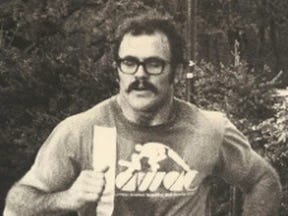Harry Geris - Buried In The Maple Leaves (Book Review)
Untold story of North American wrestling legend Harry Geris
Book review
Buried in the Maple Leaves. The untold story of North American wrestling legend Harry Geris. Written by Shawn Geris (son of Harry Geris).
This book was loaned to me by my friend and BJJ black belt, Craig Ferguson. Harry Geris was Craig’s wrestling coach at a club called AWOLS (Amateur Wrestling of London South). This was a club started by Geris in London, Ontario in the 1980’s for youth wrestlers.
Harry Geris (November 22, 1947 – April 24, 2008) was a Canadian Olympic wrestler who represented Canada in the 1968, 1972, and 1976 Olympic Games.
This book is written by Shawn Geris, the son of Harry Geris. He reads different newspaper articles recapping notable matches in Harry’s career then the background stories are told.
Harry Geris was born in the Netherlands but moved with his family to London, Ontario when he was 4 years old. He came from a large family having 8 siblings. Coming to a new country and learning a new language was very tough.
Harry grew up quick. Even as a young teen he was 6’4 and wore size 14 shoes. He was a shy kid. He was pushed to play basketball because of his height. At first Harry seemed to like the fast paced workout of basketball but that stopped after another player jumped up and landed on Harry’s ingrown toe nail. The pain was enough to make him look for another sport.
In the Geris house it was mandatory for the children to work when they were old enough. They didn’t have much and everyone had to contribute what they could. Harry delivered newspapers, sold candy, and worked at a bowling alley to help pay the household bills.
A teacher encouraged Harry to try out for the school wrestling team and it was then Harry found the sport he fell in love with. With Harry being a big man, it was difficult to find training partners his own size. Harry was not good at the start of his wrestling career, losing every match in his rookie season.
Geris got better each year and wanted to quit his part time job to dedicate more time to wrestling. His father told him “no way”, the family needed the income. Harry seemed born to wrestle. He began winning some tournaments and got noticed by Canadian Olympic wrestler Peter Michienzi, who happened to referee one of Harry’s matches.
Michienzi invited Harry Geris to train with him three times a week at his wrestling practices at a local YMCA gym. Harry was happy. Harry’s parents were not happy, worried he wouldn’t be able to work his part time job. Harry still had to pay to train with his idol, a cost of 18 dollars a year for a YMCA membership. Harry worked extra shifts at a grocery store and hid the money from his parents to pay for his wrestling membership.
Geris was a physically intimidating looking man but he was known for his gentle disposition. He would apologize to his opponents for pinning them too fast. He earned the nickname, “The Gentle Giant”. His coaches knew he had potential. Harry’s strength was his willingness to train and would push himself endlessly. He did everything his coaches asked and would often run everywhere to build up his stamina. Running to and from work, friend’s houses, and wrestling practices.
Harry competed in his first Canadian Nationals but ended up with a fever the night before. Despite that, Harry ate two pieces of apple pie the night before the competition. His coach gave him a short lecture on nutrition the next day on the way to the weigh in. But it had never occurred to Harry, who had grown up in a family of 10 eating whatever and whenever he could that any food could be “bad food”. He weighed in at 225 pounds and won the nationals defeating the defending champion in the finals.
When he told his parents that he wanted to go to college and pursue wrestling they told him, “School costs money, Harry. Money we don’t have. After you graduate high school we need you to stay around and work and help support the family.” Harry was recruited by Canadian universities but they offered no financial aid, which he desperately needed.
With help from his girlfriend, Harry applied to American colleges without his parents’ knowledge. He either received no answer or was rejected. His current wrestling coach offered Harry a spot in a special invitational wrestling event in La Grange, Illinois called the Midlands Wrestling Championship. It was for college and university wrestlers. A chance for Harry Geris to get noticed by a big American wrestling school.
Low on money Harry hitchhiked to Illinois with just his wrestling gear. 8 hours and 7 different drivers later Harry arrived at his destination. At weigh ins he was told high school wrestlers were not eligible to compete in the tournament. He wouldn’t be allowed to wrestle. Harry asked to speak to the tournament director. He told him his story and the director, moved by young mans story, agreed to let Harry compete.
Harry lost his first match of the tournament. Not the result he wanted but Harry got noticed by junior college coach Henry Pillard, who heard about his hitchhiking journey. Coach Pillard offered Harry Geris a heavyweight spot on his Joliet Junior College wrestling team in Illinois, USA. Coach Pillard was able to get tuition relief for Geris, and a few weeks after submitting his college application Harry was accepted. He hid the fact he was accepted to college from his parents because they did not support his decision to go.
Harry Geris ran away from home to go to college and pursue his wrestling dreams. He had a successful first year in junior college. Adjusting to the tougher American wrestling schedule and training partners. He became a national champion. Always pushing himself, the hitchhiking wrestler set a goal - to compete in the Olympic Games.
Harry Geris hitchhiked 1500 miles in the middle of winter from Illinois, USA to Edmonton, Alberta for the Canadian Olympic Wrestling trials. After arriving, he ate with and shared rooms with other coaches he knew at tryouts so he didn’t have any expenses. Harry won 5 matches, pinning all 5 opponents to earn a spot on the 1968 Canadian Olympic team.
The 1968 Olympic Games were held in Mexico City. Harry wrestled in both freestyle wrestling (allowed to grab opponents legs) and Greco-Roman wrestling (no leg grabs allowed) at the games. In his first match, he faced the 1960 freestyle wrestling gold medalist. Harry was pinned and defeated. Harry lost all four matches he competed in.
Embarrassed by his performance, Harry was motivated to get more international wrestling experience and return to the next Olympics four years later in 1972. He vowed he would reflect and get better.
After another dominant year wrestling at junior college, Harry’s coach Pillard negotiated a full scholarship for Geris at Oklahoma State University. Oklahoma was one of the top wrestling states in the country. Henry moved across the country with his wife Jo-Anne to continue his education and chase his dreams. A few months into Harry’s first semester, Jo-Anne got pregnant with their first child.
Surgery on a torn meniscus in his knee forced Harry to miss the entire season of his first year at Oklahoma State. This killed him and he started to feel depressed. He worked hard on his physical therapy to return. He attended every wrestling practice while injured. Hobbling in on crutches and doing push ups and sit ups while his teammates wrestled.
After his son Jason was born, Harry’s focus shifted to becoming a great father. His grades slipped below par for what was academically acceptable. Harry was not allowed to wrestle in his second semester at Oklahoma State. He studied relentlessly before his family woke up in the morning and after they went to bed. He improved his grades and was allowed to compete for the school again.
His third year Harry had finally arrived. Wrestling well in tournaments and helping his school win many team duals. Jo-Anne was pregnant with their second child, another son. Harry wrestled in the Big Eight Championships, one of the premier college wrestling tournaments in the USA. The Big Eight is the qualifier for the NCAA Championships. Harry lost a close finals match taking silver. He qualified for the 1972 NCAA Championships.
Harry Geris finished 4th at the NCAA Championships. Part of the reason was his iron grip, helped from carrying cinder blocks all summer while working construction. Next his focus was qualifying for the 1972 Canadian Olympic team. Also in 1972, his scholarship ran out and Harry could no longer afford to stay in the States. They moved back to Ontario.
Canada sent fewer wrestlers that year and cut the heavyweight category. For the first time in his career Harry would have to cut weight to make the under 220 pounds limit. He had to lose 40 pounds. He won a qualifying tournament and joined the team at the 1972 Olympic Games in Munich, Germany.
Harry beat a Japanese wrestler in the first round. He lost his next match to a Romanian wrestler in the final seconds of the match. He was shocked, lost his next match and was eliminated from the competition. He placed 9th overall.
Working hard to balance wrestling and family, Harry started to bring his sons with him to practice. He set his sights on the 1976 Olympics to be held in Montreal. A perfect final event to mark his retirement from competitive wrestling. He told nobody about his pending retirement but trained hard as possible. He felt he needed to devote more time to his wife and kids.
Harry found it harder to leave home for practice. Leaving his wife and sons often for long periods to wrestle internationally was tough. Jo-Anne got pregnant with another boy and things got even harder.
Despite the stress of having to take care of 3 young boys, Geris was able to continue his training often involving his sons. To qualify for the 1976 Olympics, he had to wrestle 290 pound Steve Scully, a football player who was drafted by the Winnipeg Blue Bombers. Harry won the best 2 out of 3 series and was on to his final Olympic Games in Montreal, Quebec, Canada.
Harry lost his first round match of the games. He won his second match before being eliminated by an undefeated wrestler from the Soviet Union. Harry Geris finished 11th place but the wrestler he beat finished 6th. Harry was now retired.
This was an inspiring story. Harry Geris did it all on his own. Working extra to pay for gym memberships, hitchhiking to tryouts, applying to colleges without any help from his parents, and running away from home to pursue his dreams.
He was a humble giant who really loved his family. When training, he was completely focused on his goals and left no stone unturned. He talked about getting “in the zone” before tournaments and blocking out all distractions.
Harry’s 3 sons all excelled in the sport of wrestling. Jason and Shawn are both Canadian National Champions. Jason “The Juggernaut” Geris finished with a career MMA record of 4 wins and 3 losses. Shawn Geris, the author of this book, is a BJJ black belt and police officer in Toronto, Ontario, Canada.
Buy a copy of this book “Buried in the maple Leaves” on Amazon. Link below.
https://www.amazon.ca/Buried-Maple-Leaves-Shawn-Geris/dp/1634490061#:~:text=a%20international%20athlete.-,He%20was%20a%20new%20Canadian%20who%20experienced%20trials%20and%20tribulations,he%20endured%20and%20eventually%20succees.
Please follow the writer Josh Presley on Instagram, YouTube, TikTok & Facebook @PresleyBJJ for daily BJJ content, and tune into The Great Canadian BJJ Show Podcast on Spotify or the podcast app. www.presleybjj.com






